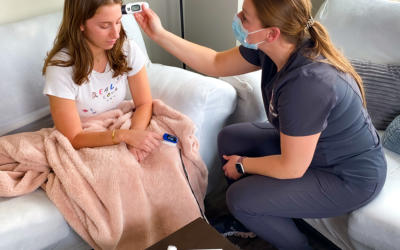Depression affects around 7% of American adults each year and some studies show that number is increasing. The National Alliance on Mental Illness (NAMI) says about 21 million U.S. adults (8.4% of the population) had at least one major depressive episode in 2020.
Depression is a serious condition plagued by unfortunate stereotypes: it isn’t a sign of weakness or a condition anyone should be expected to “snap out of.” With proper treatment, patients diagnosed with depression can manage their symptoms and thrive.
What is depression, and what causes it?
Depression is a mood disorder with persistent feelings of sadness. Often, its causes are unknown. Some factors include family history of depression, hormonal changes, aging, and certain life events, such as trauma or loss.
What are the symptoms of depression?
Depression symptoms, and the intensity of them, can vary, but here are the most common ones:
- Showing little interest in daily activities
- Feelings of worthlessness
- An aversion to leaving the house or interacting with others
- Sleep disturbances — not being able to sleep or sleeping too much
- Unhealthy eating habits — lack of appetite or overeating
- Trouble concentrating
- Physical ailments without an immediate cause, such as headaches, digestive symptoms, etc.
- Lethargy (low energy)
- Anxiety and agitation
- Angry or tearful outbursts
How can you address depressive symptoms on your own?
Sometimes you can improve signs of depression by starting to make small changes to your life on your own. Experts recommend:
- Exercise regularly. Aim for 30 to 60 minutes of activity each day
- Get enough sleep, with a goal of 7-9 hours of per night
- Manage your stress levels
- Reach out to family and friends for support
When should you seek medical care for depression?
If you’re experiencing any of the above symptoms every day or almost every day for two weeks or more, you should seek treatment. All Pivotal Health providers are trained specifically to treat behavioral health challenges like depression. If you are having thoughts of harming yourself, seek emergency care immediately.
Get Help from Pivotal Health
If you need care for symptoms of depression, connect with Pivotal Health. Our triage support team can arrange for one of our experienced licensed providers to come and speak with you in the comfort of your own home, on your own schedule. Pivotal Health clinicians assess and diagnose anxiety and depression using various tools. We can then develop an individual plan with you to help improve your depression, which may include sleep and nutrition recommendations, referring to a therapist, and/or discussing medications, depending on your situation.
All Pivotal Health clinician visits, including those to assess and treat depression, include follow-up consultation to ensure you’re on a healthy path forward.












